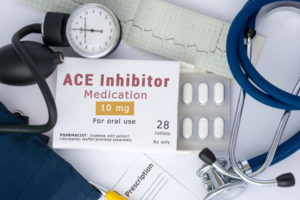 Given the discovery that the angiotensin-converting enzyme 2 (ACE-2) – a key protein in the renin-angiotensin system – is the receptor through which SARS-CoV-2 enters cells, physicians and scientists have been concerned that patients taking ACE inhibitors may be more vulnerable to COVID-19. A study was therefore undertaken to investigate any relationship between COVID-19 infection and the use of ACE inhibitors, which are antihypertensive medicines. The results have now been published in the New England Journal of Medicine.
Given the discovery that the angiotensin-converting enzyme 2 (ACE-2) – a key protein in the renin-angiotensin system – is the receptor through which SARS-CoV-2 enters cells, physicians and scientists have been concerned that patients taking ACE inhibitors may be more vulnerable to COVID-19. A study was therefore undertaken to investigate any relationship between COVID-19 infection and the use of ACE inhibitors, which are antihypertensive medicines. The results have now been published in the New England Journal of Medicine.
The observational study included more than 12,500 patients who had tested positive for COVID-19 in New York City. The authors considered whether these patients had been previously treated with any of the five common classes of medications that fight hypertension, including ACE Inhibitors, ARBs, beta blockers, calcium-channel blockers, and thiazide diuretics.
Nearly half of the patients included in the study – 5,894, or 46.8% – tested positive for COVID-19, and 17% of these infected patients had severe illness. Nearly 60% of the 4,357 patients who had a history of hypertension also tested positive for COVID-19. However, the authors found that compared to people not taking medications that act on the renin-angiotensin-aldosterone system, those taking such medications were no more likely to become infected with COVID-19 or to suffer severe illness once infected with the virus.
While more research is needed to determine if and how medications like ACE inhibitors may interact with COVID-19 risk and outcomes, this study provides data that are promising for those taking antihypertensive medications. These and future results will likely also enable physicians who are sensitive to risks around COVID-19 help their patients understand the best way to treat their conditions while also safeguarding themselves from COVID-19 or other dangerous infections.
Reference
Reynolds, H.R. (2020). Renin-angiotensin-aldosterone system inhibitors and risk of COVID-19. The New England Journal of Medicine, 382, 2441-2448.
